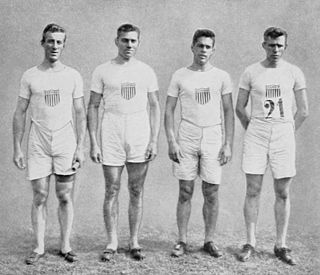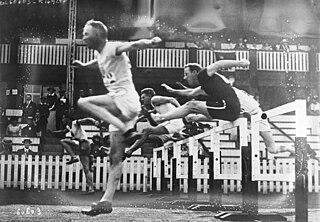
The men's 110 metres hurdles was the shorter of two hurdling events at the 1908 Summer Olympics in London. It was dominated by the American runners. The competition was held from Thursday, July 23, 1908, to Saturday, July 25, 1908. 25 hurdlers from ten nations competed. NOCs could enter up to 12 athletes. The event was won by Forrest Smithson of the United States, the fourth of five consecutive victories for the nation in the first five Olympic Games. It was also the third of four consecutive podium sweeps for the Americans in the event.
The men's 800 metres made its fourth Olympic appearance at the 1908 Summer Olympics. The competition was held on July 20, 1908, and on July 21, 1908. The races were held on a track of 536.45 metres=1⁄3 mile in circumference. It was run in two rounds, with the winners of the eight heats of the first round competing in the final.

The men's 400 metres hurdles was the longer of two hurdling events at the 1908 Summer Olympics in London. It was the third time the event had been featured at the Olympics. The Olympic record was beat three times in the course of the Games. The competition was held from Monday, July 20, 1908, to Wednesday, July 22, 1908. 15 runners from six nations competed. NOCs could enter up to 12 athletes. The event was won by Charles Bacon of the United States, defeating teammate and defending champion Harry Hillman by 0.3 seconds in the final. It was the third gold medal in three Games for the American team in the event. Hillman was the first man to earn multiple medals in the 400 metres hurdles. Jimmy Tremeer of Great Britain earned bronze, the first medal for the nation in the men's 400 metres hurdles.

The men's 100 metres was a track and field athletics event held as part of the Athletics at the 1912 Summer Olympics programme. It was the fifth appearance of the event, which is one of 12 athletics events to have been held at every Summer Olympics. The competition was held on 6 July 1912 and on 7 July 1912. Seventy runners from 22 nations competed. NOCs could enter up to 12 athletes. The event was won by Ralph Craig of the United States, as the Americans swept the medals for a second time.

The men's 200 metres was a track and field athletics event held as part of the Athletics at the 1912 Summer Olympics programme. It was the fourth appearance of the event, which has appeared at every edition of the Summer Olympics since the 1900 Summer Olympics. The competition was held on July 10, 1912, and on July 11, 1912. 61 runners from 19 nations competed. NOCs could enter up to 12 athletes. The event was won by Ralph Craig of the United States, the nation's third victory in four Games. Another American, Donald Lippincott, took silver. Great Britain earned its first medal in the 200 metres with Willie Applegarth's bronze.

The men's 800 metres was a track and field athletics event held as part of the athletics at the 1912 Summer Olympics programme. It was the fifth appearance of the event, which is one of 12 athletics events to have been held at every Summer Olympics. The competition was held from Saturday, July 6, 1912, to Monday, July 8, 1912. Forty-seven runners from 16 nations competed. NOCs could enter up to 12 athletes. The event was won by Ted Meredith of the United States, the nation's third consecutive victory in the 800 metres. Mel Sheppard became the first man to win two medals in the event, coming in second to miss out on defending his 1908 gold. Ira Davenport completed the United States sweep, the second time the Americans had swept the 800 metres podium.

The men's 1500 metres was a track and field athletics event held as part of the athletics at the 1912 Summer Olympics programme. The competition was held on Tuesday, July 9, 1912, and on Wednesday, July 10, 1912. Forty-five runners from 14 nations competed, including the Olympic champion from 1908, Mel Sheppard. NOCs could enter up to 12 athletes.

Germany competed at the 1912 Summer Olympics in Stockholm, Sweden. 185 competitors, 180 men and 5 women, took part in 69 events in 14 sports. Due to the political fallout from World War I, this was the country's last appearance until 1928.

The men's 60 metres was a track and field athletics event held as part of the Athletics at the 1904 Summer Olympics programme. It was the second and last time the event was held at the Olympics. 12 athletes from 3 nations participated. The competition was held on August 29, 1904. The event was won by Archie Hahn of the United States, with William Hogenson second and Clyde Blair third as the host nation swept the medals. It was the first of three gold medals in the sprints won by Hahn in 1904.

The men's 110 metres hurdles was a track and field athletics event held as part of the Athletics at the 1912 Summer Olympics programme. The competition was held on Thursday, July 11, 1912, and on Friday, July 12, 1912. 22 hurdlers from 10 nations competed. NOCs could enter up to 12 athletes. The event was won by Fred Kelly of the United States, the fifth of five consecutive victories for the nation in the first five Olympic Games. It was also the fourth of four consecutive podium sweeps for the Americans in the event.

The men's 4 × 100 meters relay was a track and field athletics event held as part of the Athletics at the 1912 Summer Olympics program. It was the debut of the event, which along with the 4 × 400-meter relays marked the first relays of equal legs in the athletics program. The competition was held on Monday, July 8, 1912, and on Tuesday, July 9, 1912. NOCs could enter 1 team of 4 athletes, with up to 2 reserves.

The men's 4 × 400 metres relay was a track and field athletics event held as part of the Athletics at the 1912 Summer Olympics programme. It was the debut of the event, which along with the 4 × 100 metre relay marked the first relays of equal legs in the athletics programme. The competition was held on Sunday, July 14, 1912, and on Monday, July 15, 1912. Twenty-eight runners from seven nations competed. NOCs could enter 1 team of 4 athletes, with up to 2 reserves.

The men's 3000 metres team race was a track and field athletics event held as part of the athletics at the 1912 Summer Olympics programme. It was the fourth appearance of a team race style event, though the first to be held at the distance of 3000 metres, which became the standard until the event was eliminated following the 1924 Summer Olympics. The competition was held on Friday, July 12, 1912, and on Saturday, July 13, 1912.
The men's 400 metre breaststroke was a swimming event held as part of the swimming competition at the 1912 Summer Olympics. It was the second appearance of the event, which had been introduced in 1904. The competition was held from Monday July 8, 1912 to Friday July 12, 1912.
The men's 400 metres was an event at the 1928 Summer Olympics in Amsterdam. Fifty athletes from 20 nations competed. NOCs were limited to 4 competitors each. The event was won by Ray Barbuti of the United States, the first title for the Americans in the event since 1912 and the fifth overall. Jimmy Ball won Canada's first medal in the event, a silver.
The men's 400 metres event was part of the track and field athletics programme at the 1920 Summer Olympics. The competition was held on Thursday, August 19, 1920, and on Friday, August 20, 1920. 37 runners from 16 nations competed. No nation had more than 4 runners, suggesting the limit had been reduced from the 12 maximum in force in 1908 and 1912. The event was won by Bevil Rudd of South Africa, the nation's first title in the event. Nils Engdahl's bronze was Sweden's first medal in the 400 metres.

The men's 110 metres hurdles event was part of the track and field athletics programme at the 1920 Summer Olympics. The competition was held on Tuesday, August 17, 1920, and on Wednesday, August 18, 1920. 24 runners from 15 nations competed. No nation had more than 4 runners, suggesting the limit had been reduced from the 12 maximum in force in 1908 and 1912. The event was won by Earl Thomson of Canada in world record time, the first victory by any nation other than the United States in the men's 110 metres hurdles and the first time that any non-U.S. nation had even been on the podium since 1896. Thomson, who had lived in the United States since age 8, had wanted to run for the U.S. team but was ineligible due to his Canadian citizenship. A British flag was displayed at the medal ceremony rather than a Canadian one because the organizing officials did not have the appropriate flag.
The men's 400 metres event was part of the track and field athletics programme at the 1924 Summer Olympics. This race was depicted in the film Chariots of Fire. The competition was held on Thursday, July 10, 1924, and on Friday, July 11, 1924.
The men's 400 metres sprint event at the 1932 Olympic Games took place on August 4 and August 5 at the Los Angeles Memorial Coliseum. Twenty-seven athletes from 15 nations competed. The 1930 Olympic Congress in Berlin had reduced the limit from 4 athletes per NOC to 3 athletes. The event was won by Bill Carr of the United States, that nation's second consecutive title and sixth overall in the event. Ben Eastman's silver marked the first time countrymen had gone one-two in the event since the United States did it at the first three Olympics.
The men's 400 metres was an event at the 1968 Summer Olympics in Mexico City. The competition was held between 16–18 of October. Times are listed as both hand timing and automatic timing. Hand timing was the official time used in the 1968 Olympics. Fifty-five athletes from 36 nations competed. The maximum number of athletes per nation had been set at 3 since the 1930 Olympic Congress. The event was won by Lee Evans of the United States, the fourth consecutive and 11th overall title in the event by an American. The Americans swept the podium, the second time a podium sweep occurred in the men's 400 metres.
















